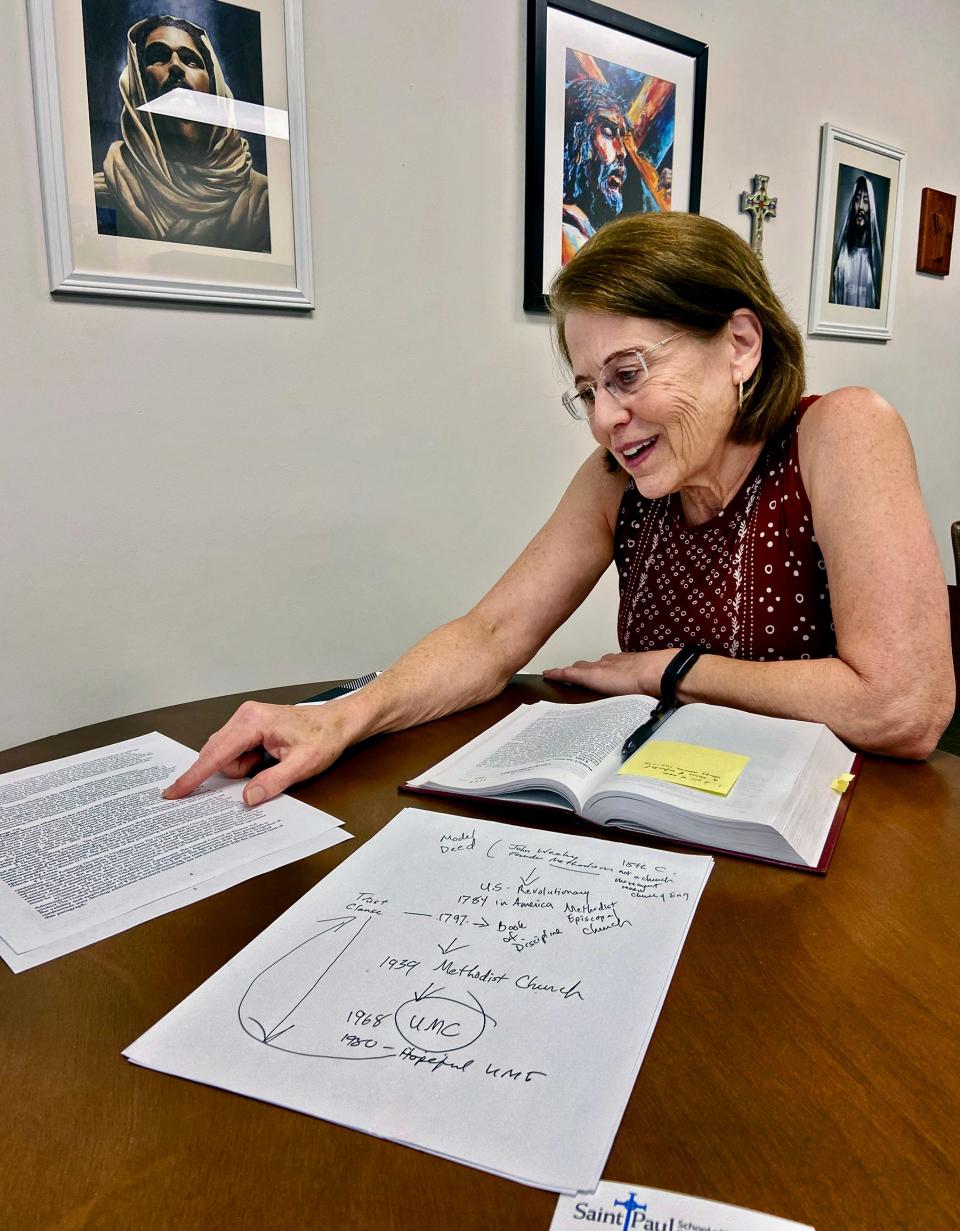Trust issues: Does Oklahoma United Methodist property dispute have historical basis?

- Oops!Something went wrong.Please try again later.
No one knows whether John Wesley might have envisioned the current wave of 84 Oklahoma church disaffiliations occurring in a Methodist denomination, but the theologian's philosophy regarding church property is at the heart of some of the contentious debates surrounding congregations heading for the exit doors.
Wesley, who is known as the primary influencer of the Methodist movement, had certain ideas about church property that belonged to Methodists, the Rev. Elaine Robinson said.
Robinson, 64, teaches at St. Paul School of Theology at Oklahoma City University and she regularly lectures on the denomination's doctrine and how it governs itself. The minister, who is also pastor of Village United Methodist Church, said when delegates at a 2019 special General Conference meeting decided to approve a provision known as Paragraph 2553 as an addendum to the United Methodist's Book of Discipline, they temporarily suspended the property provision that John Wesley was adamant about.
And now, in a manner of speaking, there are trust issues.
"John Wesley had this thing called the 'model deed,'" Robinson said. "It said if Methodists buy a property, it must always be used by Methodists. They didn't want someone to buy the property and then they might say, 'we don't want you in this space.' So, property was governed in 18th-century Methodism as a way of ensuring that those properties would always be used by Methodists. In 1797, this was adopted by the Methodist Episcopal Church and basically becomes part of that Book of Discipline."
More: What we know: Oklahoma churches seeking to cut ties with United Methodist denomination
The minister said the model deed premise evolved into the trust clause provision in the United Methodist denomination's current Book of Discipline. The policy book has been changed over time, but the trust clause has been a fixture.
"This provision we call the trust clause is nothing new ... so when a church says 'I don't want my property to be used for the United Methodist Church,' that's where the problem comes in," Robinson said.
A 'gracious exit' for churches looking to leave
The Paragraph 2553 provision was approved to give churches in the international United Methodist a "gracious exit" if they were in disagreement over human sexuality. Under this special provision, churches wishing to disaffiliate from the denomination have until Dec. 31 to take part in a special disaffiliation process allowing them to sever ties and take their church properties and assets with them.
Robinson said a congregation wishing to cut ties would have to pay the denomination the full value of their church property if they were to leave at any other time.

"Under normal circumstances, if it's $1.5 million, they pay $1.5 million," she said.
The special conference gathering that saw the adoption of Paragraph 2553 had been requested by delegates who met in 2016. Robinson said the 2016 delegates had hoped that the 2019 meeting would help put an end to the raging debates over the denomination's ban on same-sex marriage and gay ordination. The 2019 General Conference delegates agreed and felt that Paragraph 2553 was needed "because we've been so caught up in spending all the time talking about what to do about human sexuality," the minister said.
Recently, debate has erupted over who makes decisions about disaffiliation.
Two Oklahoma City churches have filed lawsuits against the Oklahoma United Methodist Conference, claiming that regional conference leaders have prevented them from exiting the denomination under Paragraph 2553 because the conference has an eye to keep the churches from cutting ties and taking their valuable property with them.
Robinson said she didn't want to give her opinion about the individual court cases involving First United Methodist Church, 131 NW 4, and Church of the Servant, 14343 N MacArthur. But she did say that these matters harken to John Wesley's insistence that Methodist properties be used for Methodist purposes.
More: Email sheds light on what's next for First Church and Oklahoma United Methodist Conference
Along those lines, the minister said no one but the United Methodist Church should have a say in what happens regarding property matters within the denomination. She said United Methodist bishops and other leaders were given certain parameters to follow with Paragraph 2553, and they, along with conference delegates, should have final say over what occurs in disaffiliation matters.
Robinson said the Book of Discipline is created by United Methodist delegates from around the world who are elected by local churches. She said the only entity that can write legislation rules is the General Conference, not local churches or a bishop. The General Conference meets every four years, and that's where legislation is voted on, but bishops have the authority to interpret these laws within their conferences.
The minister said those decisions may be reviewed by the denomination's Judicial Council.
"So, we are very democratic — we have checks and balances and review," she said.
How church property rights works in other Christian denominations
Meanwhile, Robinson said not everyone knows about the United Methodist trust clause; even some United Methodist pastors and laity may not understand it. Also, she said some people may have certain views of who owns church property based on the prevailing norms of churches in their area.
She said some Oklahomans' views of how churches function may be influenced by their understanding of how Southern Baptists, the largest faith group in the state, regard church property — which is vastly different from United Methodists.
Rather than a trust clause, Southern Baptist churches are autonomous, meaning the local church has autonomy over its decisions, including those regarding property.
More: From a judge's rejection to $30M in assets: First Church United Methodist's day in court
"For Baptists, local congregational authority is in place," Robinson said. "Every kind of church has a different way of governing itself, and if you come out of a tradition where the local church governs itself, you don't understand that for United Methodists, our system is what we call 'connectional' — meaning we're all interrelated and decision making comes from other levels."
Leaders affiliated with other denominations agree with Robinson's assessment that church property issues can be complex.
"It's complicated," said George Rigazzi, the Archdiocese of Oklahoma City's archivist. "Each denomination has something different."
Here is a look at how church property and assets are handled in three other denominations.
Episcopal Church
Susanna LeMasters, communications director for the Episcopal Diocese of Oklahoma, said the Episcopal Church's canons — church law ― specifically addresses property and assets: "All real and personal property held by or for the benefit of any Parish, Mission or Congregation is held in trust for this Church [i.e., the Episcopal Church] and the Diocese thereof in which such Parish, Mission or Congregation is located. The existence of this trust, however, shall in no way limit the power and authority of the Parish, Mission or Congregation otherwise existing over such property so long as the particular Parish, Mission or Congregation remains a part of, and subject to, this Church and its Constitution and Canons.”
"In other words, all property is held in trust for the wider Church," LeMasters said.
Catholic Church
Rigazzi, a canon lawyer, said the Archdiocese of Oklahoma City, under the current archbishop (and his successor), owns the property where parish churches are built, and what is on each property belongs to the parish. Rigazzi said a parish, under canon law, is considered a "public juridic person" so it has certain rights. Having said that, Rigazzi said parishioners wouldn’t be allowed to sell the parish church building, and if a group of parishioners wanted to end their affiliation with the Catholic Church, they would not have the option to take the church building with them.
"The archbishop is owner of the properties, as far as the land and everything else, technically, but what's in the parish, belongs to the parish," Rigazzi said. "So in that sense, he (archbishop) can't go into a parish and say, 'You know, the $600,000 you have in savings? I want it.'"
Rigazzi said the issue is complicated.
"They (parishioners) can't build a building without his (bishop's) permission. It's very much tied to the diocese and the bishop represents the dioceses."
Southern Baptists
Churches affiliated with the Southern Baptist Convention are known for their autonomy.
"We recognize that, in the New Testament, there was no centralized ecclesiastical authority over the churches that forced the churches into any form of compliance," said a statement on the convention's website. "There was encouragement, exhortation, and admonition, but there was never enforcement. We strongly adhere to that principle. Jesus Christ is the head of the local church — we are not. Each church is responsible before God for the policies it sets and decisions it makes."
In other words, local church property and assets would be the under the purview of the local church.
Churches are deemed in "friendly cooperation" with the denomination as long as they adhere to the Southern Baptist Convention's Baptist Faith & Message 2000, a doctrinal statement. The nation's largest Protestant denomination famously ejected evangelist and author Rick's Warren's Saddleback Church in June, claiming the California megachurch was no longer considered in friendly cooperation with the denomination. But that had to do with Saddleback's ordination of female pastors, which is against the Southern Baptist Convention's doctrinal beliefs, and had nothing to do with property.
This article originally appeared on Oklahoman: Methodism's John Wesley had certain ideas about Methodist property

